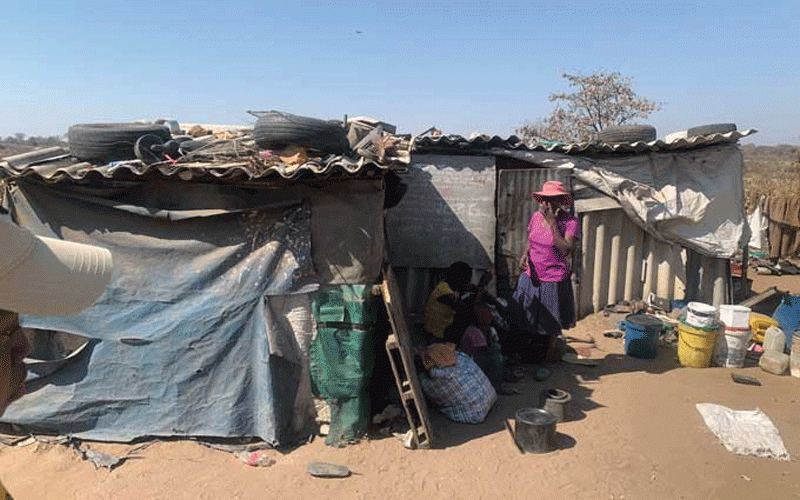
MEVIS Muleya (51) of Beitbridge, better known as Mia Coe is a living example of a poor millionaire.
Married with six children, she was born in Denver village to Annah and Thomas Kibi Muleya both from Beitbridge.
Mia Coe works and lives in the border town with her spouse James Sibanda.
Her fame and unclaimed millionaire status lies far away from her humble job as a cleaner for a company contracted by the government to maintain several State buildings.
Mia Coe is a home-made guru in cooking and preparing traditional meals.
Self-development of what she learnt from her mother as a girl or woman’s role has seen Mia Coe travel across the country for numerous cooking competitions where her Venda dishes have caught judges’ eyes.
Her meals left many judges with a good taste in the mouth but has not unlocked her full potential.
It however, led her from the Beitbridge Expo competition, to district, provincial, national and ultimately Southern African Development Community (Sadc) cookout exhibitions recently hosted in Masvingo.
- Beitbridge woman cooks her way to Sadc
Keep Reading
With proper financial backing and marketing, Mia Coe could realise her millionaire status selling her traditional food and standing shoulder to shoulder next to international brands.
“I was taught by my mother; she would beat me up when I missed a step. She expected discipline in how I made meals and was strict on mannerisms, deportment and our traditional Ubuntu,” Mia Coe told NewsDay Weekender Society.
“Apart from cooking, I was taught the execution of several home disciplines, traditional remedies to minor ailments, nutritious foods and how to blend them.
“Storage of food to retain nutrients is among the subjects. Did you know drying vegetables has a skill? Yes, it does to retain taste.”
She continued: “Traditional dishes, vegetables like muboora (pumpkin leaves) cooked by marula nuts are a delicacy. There is baobab yoghurt and of late I modify adding varieties of stored flavours.”
“Education has shown us that yoghurt provides iron and gives warmth to the body. I have also heard it's an almost natural healing for hypertension although I cannot prove that.
“I easily extract baobab powder from the fruits and mix that with milk and prepared vanilla and watermelon to make rich yoghurt.”
Research shows that baobab is a good source of many important vitamins and minerals and its nutritional content can vary depending on the geographical location of the tree.
Beitbridge has thousands of the giant fruit trees whose different parts such as the leaves, pulp and seeds provide various food properties.
For instance, research shows that the pulp is high in vitamin C, antioxidants and several key minerals like potassium, magnesium, iron and zinc.
Mia Coe said her other dishes include millet sadza which is satisfying and “stays in the stomach” and lowers blood sugar levels.
“I also cook pumpkin and watermelon seeds from the lessons I got as a girl. I heard these are good for men and the bone marrow. They can also be used in porridge,” she said.
Her skill saw her come out on top at the Beitbridge Expo provincial cookout, but was fourth at a national contest held in Chinhoyi.
However, as a result of the rare presentation, she was included in the team that met 10 Sadc countries at the Great Zimbabwe Monuments for this year’s contest.
“Namibia came first and we were second followed by the Democratic Republic of Congo. I found it so exalting to be in a team that performed so well,” she said.
At that contest where food was prepared all night long, she cooked pumpkins, banana yoghurt, boiled sorghum eaten with marula nuts, maheu from millet, dried ground chimukuyu, roasted traditional chicken.
“It indeed was a whole night of cooking. It made me feel complete. I just love cooking,” she said.
“Modifying foods has become my new source of joy, and these competitions have exposed me to new foods. I am working on one meal I am not free to disclose now.
“No one knows the ingredients of certain drinks like Coca-Cola, it is a strength one must not share,” she laughed.
Mia Coe uses mopani firewood and gas as fuel.
The woman believes while she may have not gone to any tertiary school for her cooking, traditional skills of cooking should be introduced as a subject in schools.
Mia Coe feels Zimbabweans could earn a living from exporting their traditional foods including the dishes like amacimbi, otherwise known as mopani worms.
Despite her successes, she remains a poor millionaire who just needs an enabling environment for her breakthrough.











